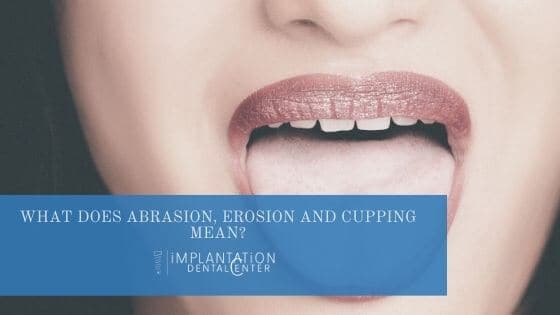Learn Dental Terminology
Teeth, like bones, can wear down with age and use. The different types of wear have names that dental professionals use. Today we discuss common dental issues: cupping, dental abrasion, and dental erosion.
What is cupping?
The enamel can become perforated or erode due to normal use and wear and tear. This creates a concave erosion on the biting surface of the teeth. The erosion is referred to as cupping.
What is tooth abrasion?
Tooth abrasion is when your teeth start to lose enamel due to some sort of outside force. This is different from tooth erosion which is where acids are the cause and it’s different from tooth attrition where the upper and lower teeth rub together and damage each other. The most important piece of advice from Implantation Dental Center is to find out what’s causing the problem so you know how to fix it.
How does tooth abrasion happen?
Tooth abrasion can happen for a variety of reasons. It can arise from improper brushing and flossing habits, brushing too hard or not at all, and grinding the mouth guard from a sports injury. Other causes, including tooth sensitivity or gum disease, can weaken the teeth and make them more susceptible to tooth abrasion.
-Brushing improperly: Brushing your teeth too hard without proper technique may result in tooth abrasions. When you brush your teeth it is important that you use light pressure with an appropriate toothbrush head size and enough toothpaste on the bristles. You should avoid brushing directly against your gums as this could result in bleeding from the gums which will lead to heartburn.
-Brushing too hard: Your teeth should not be brushed too hard to achieve a clean feeling. Brushing your teeth with excessive force can cause sensitive enamel to wear away. If you feel that it is taking two or three times longer than normal to brush your teeth, then you are brushing them too hard.
-Brushing too often: Brushing your teeth too often can cause you to brush away the protective enamel coating that protects them. Each individual’s level of susceptibility varies but people with thin enamel are at a higher risk for developing abrasion.
-Using improper brushing technique: The right toothbrush head size and method is needed to brush teeth properly. An overly soft toothbrush could be too gentle and cause the abrasion to worsen, while an overly hard brush could be too rough and damage your enamel.
-Gum disease: Gum disease is a common cause of toothbrush abrasion due to the recurring pain it causes. The discomfort can lead you to brush a little harder than you should and eventually cause your gums to recede, which can lead to tooth abrasion.
-Grinding the mouth guard: Improperly worn sports mouth guards can also be responsible for tooth abrasion in endurance athletes that engage in contact sports such as football or rugby.
What is tooth erosion?
Tooth erosion is one of the most common dental problems, resulting from frequent consumption of acidic beverages such as soda. Acidic drinks can cause tooth enamel to dissolve by removing certain minerals that make up the outermost layer of the teeth. The American Dental Association recommends that people who drink these kinds of beverages frequently should rinse their mouth with water or chew sugar-free gum to compensate for it’s damaging effect on their teeth.
Can tooth abrasion and erosion be reversed?
There are ways to restore the teeth to a more natural shape. This can be done by placing a small, minimally invasive composite restoration. The restoration helps to prevent further erosion of the lesions which may deepen over time.
The composite acts as an artificial enamel to protect the underlying dentin. This procedure is relatively simple. It can be completed without local anesthesia.
The downside to these is that the fillings are so small that they need to be replaced more often than regular fillings. Still, these are important because they help to preserve the tooth structure and prevent further damage.
If you are concerned about damage or erosion of your teeth, call our office in Plantation, Florida today to schedule an appointment.



